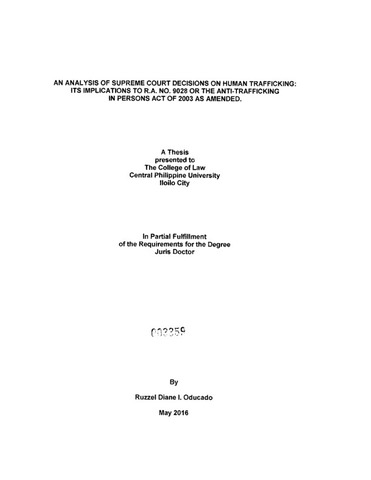An analysis of Supreme Court decisions on human trafficking: Its implications to R.A. No. 9028 or the Anti-Trafficking in Persons Act of 2003 as amended.

Page views
20,855Date
2016Author
Thesis Adviser
Defense Panel Chair
Share
Metadata
Show full item record
Abstract
Trafficking in Persons is a crime against humanity and is considered a human rights violation. Not only the Philippines but all other nations seek to eradicate It is the aim not only of our country but of every State to eradicate such act which causes multiple other problems. It is the policy of our State promote human dignity, protect the people from any threat of violence and exploitation, eliminate trafficking in persons, and mitigate pressures for involuntary migration and servitude of persons, not only to support trafficked persons but more importantly, to ensure their recovery, rehabilitation and reintegration into the mainstream of society.
The current stance of the law is laid down, and this non-experimental, qualitative research was conducted to determine the impact of R.A. 9028 or the Anti-Trafficking in Persons Act of 2003 as amended through an analysis of the law, its amendments, Supreme Court decisions, government reports and statistics, and other pertinent literature.
R. A. No. 9028 was analyzed and differentiated from R.A. 10364, the law amending the former. Jurisprudence related to the law was also examined to see patterns in the cases and provide an analysis of the application or implementation of the law. Moreover, an analysis of government report on cases was conducted.
The results of this study, through the comparison of the two (2) laws, revealed that many significant amendments introduced under R.A. No. 10364 had given more teeth to the law which seeks to eliminate trafficking activities.
While there were no data analyzed as to Regional Trial Court decisions, an analysis of the Supreme Court decisions exposed the weakness of the judiciary as to the promptness of the resolution of cases.
The examination of reports from IACAT showed, among others, more convictions after the enactment of the Expanded Anti-Trafficking in Persons Act of 2013.
While the amendments to the Anti-Trafficking in Persons Act of 2003 made a significant impact on the implementation of the law, the Philippines remained Tier 2. While trafficking activities cannot be wiped out completely, more actions on the part of the government are sought. Tier 1 is a goal, and it means implementation of the law through vigorous prosecution, proactive victim identification, victim protection efforts, legal assistance, and more governmental measures to prevent human trafficking.
Description
Abstract only
Suggested Citation
Oducado, R. D. I. (2016). An analysis of Supreme Court decisions on human trafficking: Its implications to R.A. No. 9028 or the Anti-Trafficking in Persons Act of 2003 as amended. (Unpublished postgraduate thesis). Central Philippine University, Jaro, Iloilo City.
Type
ThesisSubject(s)
Department
College of LawDegree
Juris DoctorShelf Location
Law Library 340.72 Od8
Physical Description
vii, 113 leaves
Collections
- Juris Doctor [144]
The following license files are associated with this item:


